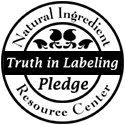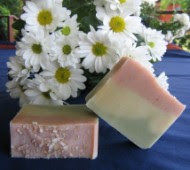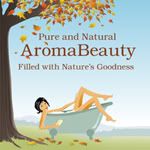I was at the Markets on the weekend selling my handmade organic soaps and I wanted to share the conversation I had with a lady that was there. As this lady smelt my soaps, she mentioned that one particular bar smelled beautiful, very similar she said to a Lush soap she was using.
When I mentioned that my All Natural soaps didn’t contain chemicals like the Lush soaps do, she said “oh no, Lush soaps are all natural”. Now I know that this is not the case as a friend of mine had given me one of their large, full colour brochures that contained a list of the ingredients used in their soaps. When I explained this to the lady she was still adamant that Lush soaps are “all natural.”
WHY IS THIS? Maybe it’s because in their brochure it mentions quite a few times, about the ingredients used in their products being natural. We tend to take for granted that if a Company says their products are natural, then that makes them chemical free. Sadly, this is not the case.
Sure, Lush products do contain some lovely natural ingredients, but what about the chemicals that they also contain? To their credit Lush does mention quite openly on their website that there are some synthetic ingredients contained in their soaps, the reason they quote is “because they are the most effective, safe carriers for the natural ingredients we use.” Now I’m not sure that everyone would agree with this statement.
Lush isn’t the only Company that uses these chemicals in their soaps, in fact there are many, many more who use not only these chemicals, but numerous other chemicals, some of which are even more toxic than the ones used by Lush. I’ve only mentioned this particular Company because of the encounter I had with this lady on the weekend.
Let’s have a closer look at the ingredients contained in one of Lush’s soaps.
Ingredients:
Water, Propylene Glycol, Sodium Palm Kernelate, Sodium Stearate, Sodium Lauryl Sulfate, Perfume, Glycerine, Patchouli Oil, Orange Oil, Lavendin Oil), Pine Oil, Lemongrass Oil, Elemi Oil, Sodium Chloride, Tetrasodium EDTA, Gardenia Extract, Colour 18050.
Propylene Glycol - exposure to high levels of Propylene Glycol is known to cause serious and potentially irreversible health conditions. According to the safety data sheets of industrial chemical manufacturers, chemicals such as Propylene Glycol will cause serious health conditions, including liver and heart damage and damage to the central nervous system if sufficient is absorbed by the body. This chemical has also been linked to Neurotoxicity, Endocrine disruption and Cancer.
Propylene Glycol is used as antifreeze, airplane de-icer and to make polyester and solvents in the paint and plastics industries, just to name a few. When you purchase a drum of propylene glycol from a supplier, that supplier is required to furnish an MSDS (Material Safety Data Sheet). The MSDS for propylene glycol says "Avoid skin contact." Does this sound like something you want to be using on your skin every day?
Sodium Lauryl Sulfate (SLS) - This chemical is used in soaps and shampoos because it is an inexpensive detergent that allows the product to foam well.
A report published in the Journal of The American College of Toxicology, showed that concentrations as low as 0.5% could cause irritation and concentrations of 10-30% caused skin corrosion and severe irritation. Some soaps have concentrations of up to 30%, which the ACT report called "highly irritating and dangerous". Studies have indicated that SLS enters and maintains residual levels in the heart, liver, lungs and brain from skin contact. Other research has indicated sodium lauryl sulfate may be damaging to the immune system, especially within the skin and can cause irritation to the skin, eyes or lungs.
Perfume - Shamefully, only 84% of the ingredients used in today’s synthetic fragrances have never been tested for human toxicity, or have had only minimal testing. In a list of 2,983 chemicals used by the fragrance industry, the National Institute of Occupational Safety and Health identified 884 toxic substances. These compounds are capable of causing breathing difficulty, allergic reactions, multiple chemical sensitivities, and other serious maladies, including neurological damage.
The FDA has acknowledged that the incidence of adverse reactions to perfume products appears to be increasing and that these reactions involve the immune and neurological systems. A recent government report targeted synthetic fragrances as one of the six categories of chemicals that should be given the highest priority for neurotoxicity testing along with insecticides, heavy metals, solvents, food additives, and air pollutants.
The only way you’ll know for sure ALL of the ingredients contained in a product, is to read the label carefully.
If you don’t know what an ingredient is and it sounds like it could be a chemical, you can be pretty sure it will be one. The Chemical and Beauty Industry tell us that "small" quantities of chemicals are "safe'"to use on our skin. But what happens when we are using these chemicals EACH AND EVERY DAY?
(Didn’t the Cigarette manufacturers deny any health risks associated with toxic chemicals contained in cigarette smoke for over 25 years?) We know for a fact that there is more and more cancer being diagnosed every day. Could it be that these chemicals we are bombarding our bodies with are building up in our system and making us sick? I personally think so.
Some people have told me they really don’t know how to tell if an ingredient is natural or chemical. The easiest way is to ask yourself, do you know what the word means? Like lavender, lemongrass, orange, we all know what these are. Also ask yourself, would you feel happy about eating it or rubbing it on your skin? I found that these methods helped me when I first learnt about chemicals in our skincare products.
Why risk using products that contain chemicals when there are safer alternatives to use?
Pure and Natural AromaBeauty offers you a chemical free safe alternative to chemical filled soap bars.
Subscribe to:
Post Comments (Atom)

.jpg)
.jpg)
.jpg)








Very comprehensive Jan, well done! Does make you wonder what is in the things we use every day...
ReplyDeleteThanks Hamperific, I think if we knew exactly what chemicals we were using everyday, it would be quite scary.
ReplyDeleteI really enjoyed the article posted regarding harmful ingredients in personal care products. It was very informative, and I believe you are absolutely correct about the negative impact that these chemicals can have on our bodies. I have discovered several amazing reports to validate your position, and I think you would find the information fascinating. I would love to discuss this further with you. Please email me at your earliest convenience at tdeann24@gmail.com. One report in particular is very serious in nature and was documented on CNN. I’ll send you a link.
ReplyDeleteThanks Taylor, I'm glad you enjoyed it. I've been researching the subject over the past 6 years and I'd love to let as many people as I can know about it. Thanks again,
ReplyDelete